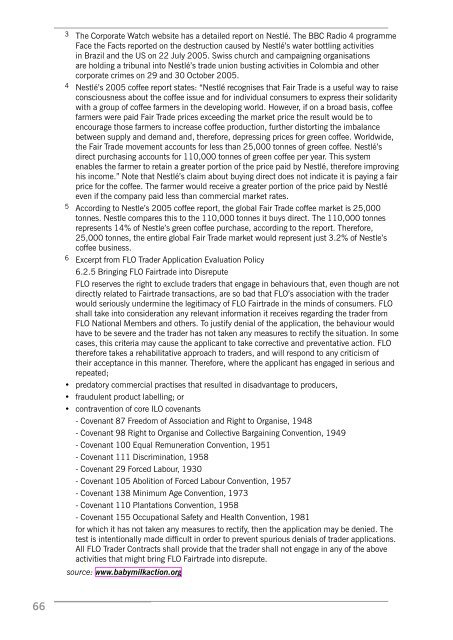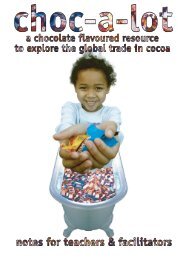Cost of coffee.indd - RISC
Cost of coffee.indd - RISC
Cost of coffee.indd - RISC
Create successful ePaper yourself
Turn your PDF publications into a flip-book with our unique Google optimized e-Paper software.
3 The Corporate Watch website has a detailed report on Nestlé. The BBC Radio 4 programme<br />
Face the Facts reported on the destruction caused by Nestlé’s water bottling activities<br />
in Brazil and the US on 22 July 2005. Swiss church and campaigning organisations<br />
are holding a tribunal into Nestlé’s trade union busting activities in Colombia and other<br />
corporate crimes on 29 and 30 October 2005.<br />
4 Nestlé’s 2005 c<strong>of</strong>fee report states: “Nestlé recognises that Fair Trade is a useful way to raise<br />
consciousness about the c<strong>of</strong>fee issue and for individual consumers to express their solidarity<br />
with a group <strong>of</strong> c<strong>of</strong>fee farmers in the developing world. However, if on a broad basis, c<strong>of</strong>fee<br />
farmers were paid Fair Trade prices exceeding the market price the result would be to<br />
encourage those farmers to increase c<strong>of</strong>fee production, further distorting the imbalance<br />
between supply and demand and, therefore, depressing prices for green c<strong>of</strong>fee. Worldwide,<br />
the Fair Trade movement accounts for less than 25,000 tonnes <strong>of</strong> green c<strong>of</strong>fee. Nestlé’s<br />
direct purchasing accounts for 110,000 tonnes <strong>of</strong> green c<strong>of</strong>fee per year. This system<br />
enables the farmer to retain a greater portion <strong>of</strong> the price paid by Nestlé, therefore improving<br />
his income.” Note that Nestlé’s claim about buying direct does not indicate it is paying a fair<br />
price for the c<strong>of</strong>fee. The farmer would receive a greater portion <strong>of</strong> the price paid by Nestlé<br />
even if the company paid less than commercial market rates.<br />
5 According to Nestle’s 2005 c<strong>of</strong>fee report, the global Fair Trade c<strong>of</strong>fee market is 25,000<br />
tonnes. Nestle compares this to the 110,000 tonnes it buys direct. The 110,000 tonnes<br />
represents 14% <strong>of</strong> Nestle’s green c<strong>of</strong>fee purchase, according to the report. Therefore,<br />
25,000 tonnes, the entire global Fair Trade market would represent just 3.2% <strong>of</strong> Nestle’s<br />
c<strong>of</strong>fee business.<br />
6 Excerpt from FLO Trader Application Evaluation Policy<br />
6.2.5 Bringing FLO Fairtrade into Disrepute<br />
FLO reserves the right to exclude traders that engage in behaviours that, even though are not<br />
directly related to Fairtrade transactions, are so bad that FLO’s association with the trader<br />
would seriously undermine the legitimacy <strong>of</strong> FLO Fairtrade in the minds <strong>of</strong> consumers. FLO<br />
shall take into consideration any relevant information it receives regarding the trader from<br />
FLO National Members and others. To justify denial <strong>of</strong> the application, the behaviour would<br />
have to be severe and the trader has not taken any measures to rectify the situation. In some<br />
cases, this criteria may cause the applicant to take corrective and preventative action. FLO<br />
therefore takes a rehabilitative approach to traders, and will respond to any criticism <strong>of</strong><br />
their acceptance in this manner. Therefore, where the applicant has engaged in serious and<br />
repeated;<br />
• predatory commercial practises that resulted in disadvantage to producers,<br />
• fraudulent product labelling; or<br />
• contravention <strong>of</strong> core ILO covenants<br />
- Covenant 87 Freedom <strong>of</strong> Association and Right to Organise, 1948<br />
- Covenant 98 Right to Organise and Collective Bargaining Convention, 1949<br />
- Covenant 100 Equal Remuneration Convention, 1951<br />
- Covenant 111 Discrimination, 1958<br />
- Covenant 29 Forced Labour, 1930<br />
- Covenant 105 Abolition <strong>of</strong> Forced Labour Convention, 1957<br />
- Covenant 138 Minimum Age Convention, 1973<br />
- Covenant 110 Plantations Convention, 1958<br />
- Covenant 155 Occupational Safety and Health Convention, 1981<br />
for which it has not taken any measures to rectify, then the application may be denied. The<br />
test is intentionally made difficult in order to prevent spurious denials <strong>of</strong> trader applications.<br />
All FLO Trader Contracts shall provide that the trader shall not engage in any <strong>of</strong> the above<br />
activities that might bring FLO Fairtrade into disrepute.<br />
source: www.babymilkaction.org<br />
66




